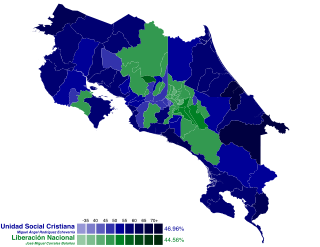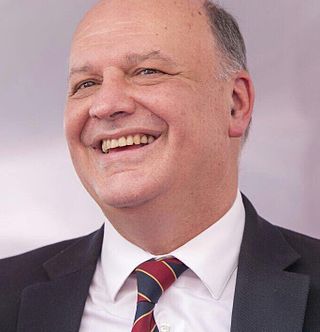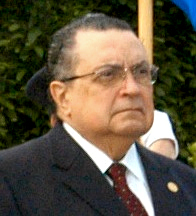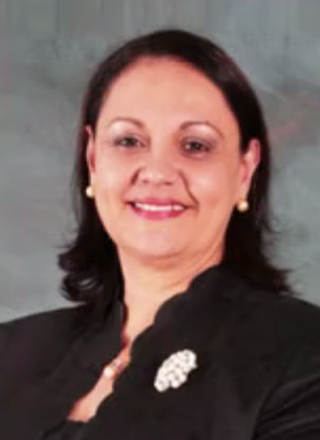
The politics of Costa Rica take place in a framework of a presidential, representative democratic republic, with a multi-party system. Executive power is exercised by the president and their cabinet, and the President of Costa Rica is both the head of state and head of government. Legislative power is vested in the Legislative Assembly. The president and 57 Legislative Assembly deputies are elected for four-year terms. The judiciary operates independently from the executive and the legislature, but is involved in the political process. Costa Rica has a strong system of constitutional checks and balances. Voting is compulsory, but this is not enforced.

The National Liberation Party, nicknamed the verdiblancos, is a political party in Costa Rica. The party is a member of the Socialist International. Social-democratic by statute, the party has a few internal factions, including liberals, Third Way supporters, centrists, and social conservatives.

General elections were held in Costa Rica on 26 July 1953. José Figueres Ferrer of the National Liberation Party won the presidential election, whilst his party also won the parliamentary election. Voter turnout was 67% in the presidential election and 68% in the parliamentary election. Local elections were also held.

General elections were held in Costa Rica on 2 February 1958. Mario Echandi Jiménez of the National Union Party won the presidential election, whilst the National Liberation Party won the parliamentary election. Voter turnout was 64.7%.

General elections were held in Costa Rica on 7 February 1982. Luis Alberto Monge of the National Liberation Party won the presidential election, whilst his party also won the parliamentary election. Voter turnout was 79%.

General elections were held in Costa Rica on 2 February 1986. Óscar Arias of the National Liberation Party won the presidential election, whilst his party also won the parliamentary election. Voter turnout was 82%.

General elections were held in Costa Rica on 4 February 1990. Rafael Ángel Calderón Fournier of the Social Christian Unity Party (PUSC) won the presidential election, whilst his party also won the parliamentary election. Voter turnout was 81.8%.

General elections were held in Costa Rica on 6 February 1994. José María Figueres of the National Liberation Party won the presidential election, whilst his party also won the parliamentary election. Voter turnout was 81%.

General elections were held in Costa Rica on 1 February 1998. Miguel Ángel Rodríguez of the Social Christian Unity Party won the presidential election, whilst his party also won the parliamentary election. Voter turnout was 70%, the lowest since the 1950s.

A primary election was held among the members of Costa Rica’s National Liberation Party (PLN) on June 3, 2001 in order to choose PLN’s nominee for presidency in the 2002 general election. PLN was then the main opposition party facing then in government Social Christian Unity Party. This, as was common since the 70s, was an open primary and as such all Costa Ricans could vote in it with the only requirement be signing membership of the party moments before entering the polls.

The Social Christian Unity Party (PUSC) presidential primary of 2017 or Social Christian National Convention as is known in Spanish was an electoral process for the selection of the party's presidential candidate for the 2018 Costa Rican general election and was scheduled for June 4, 2017.

The 2013 presidential primary of the Social Christian Unity Party of Costa Rica was held on May 9, 2013, as part of the 2014 Costa Rican general election. The two main traditional factions of PUSC competed for the nomination. The competing parties were Costa Rica's Children's Hospital Dr. Rodolfo Hernández, and the lawyer, businessman, and former president of the Costa Rican Social Security Fund Rodolfo Piza. This was PUSC's fifth primary election in its history and the first in twelve years.

The 2001 presidential primary of the Social Christian Unity Party of Costa Rica was held on June 10, 2001, as part of the 2002 Costa Rican general election.

Rodolfo Piza Rocafort is a Costa Rican politician and lawyer. He served as executive president of the Costa Rican Social Security Fund during the administration of Miguel Ángel Rodríguez (PUSC), and later served as justice of the Supreme Court of Justice.

The Social Christian Republican Party is a Costa Rican political party founded in 2014 by former president Rafael Ángel Calderón Fournier and his group of supporters as a splinter from the historical Social Christian Unity Party (PUSC). The party also uses the colors and a similar name of Calderón's father's party, the National Republican Party.

Liberalism in Costa Rica is a political philosophy with a long and complex history. Liberals were the hegemonic political group for most of Costa Rica's history especially during the periods of the Free State and the First Republic, however, as the liberal model exhausted itself and new more left-wing reformist movements clashed during the Costa Rican Civil War liberalism was relegated to a secondary role after the Second Costa Rican Republic with the development of Costa Rica's Welfare State and its two-party system controlled by social-democratic and Christian democratic parties.

The Reform State or Reformist State is a period in Costa Rican history characterized by a change in the political and economic paradigm. During this period, the country switched from the uncontrolled capitalism and laissez faire approach of the Liberal State into a more economically progressive Welfare State. The period ranges from approximately 1940, starting with the presidency of social reformer Rafael Angel Calderón Guardia, and ends around the 1980s with the neoliberal reforms inherent in the Washington Consensus that began after the government of Luis Alberto Monge.

Calderonism or Calderonismo is a political and ideological doctrine of Costa Rica, which emerged in the 1940s under the leadership of caudillo Dr. Rafael Ángel Calderón Guardia, before, during and after he was president with his National Republican Party, and which was continued by various political forces such as Unity Coalition, National Unification Party and the current Social Christian Unity Party and its split the Social Christian Republican Party. It is together with Liberacionismo one of the two traditional political tendencies of Costa Rican politics, with which it represented a certain type of Costa Rican bipartisanship from 1986 to 2002 and revolves around the Calderón family. It is a form of populist and Catholic Christian socialism very similar to Argentine Peronism.

General elections were held in Costa Rica on 6 February 2022, to elect the president, two vice-presidents, and all 57 deputies of the Legislative Assembly. As none of the presidential nominees obtained at least 40% of the votes, a runoff was held on 3 April 2022, between the top two candidates, José María Figueres and Rodrigo Chaves Robles.

The 2021 Social Christian Unity Party presidential primary, also known as the Social Christian National Convention was the primary election process by which supporters of the Social Christian Unity Party selected their presidential candidate for the 2022 general elections. Former Vice-president during the Pacheco administration Linneth Saborío won the election over her two rivals, lawmakers Muñoz and Masís.


















